Along with verbal appeals, Israel is preparing militarily, write Ariel Gold and Medea Benjamin.
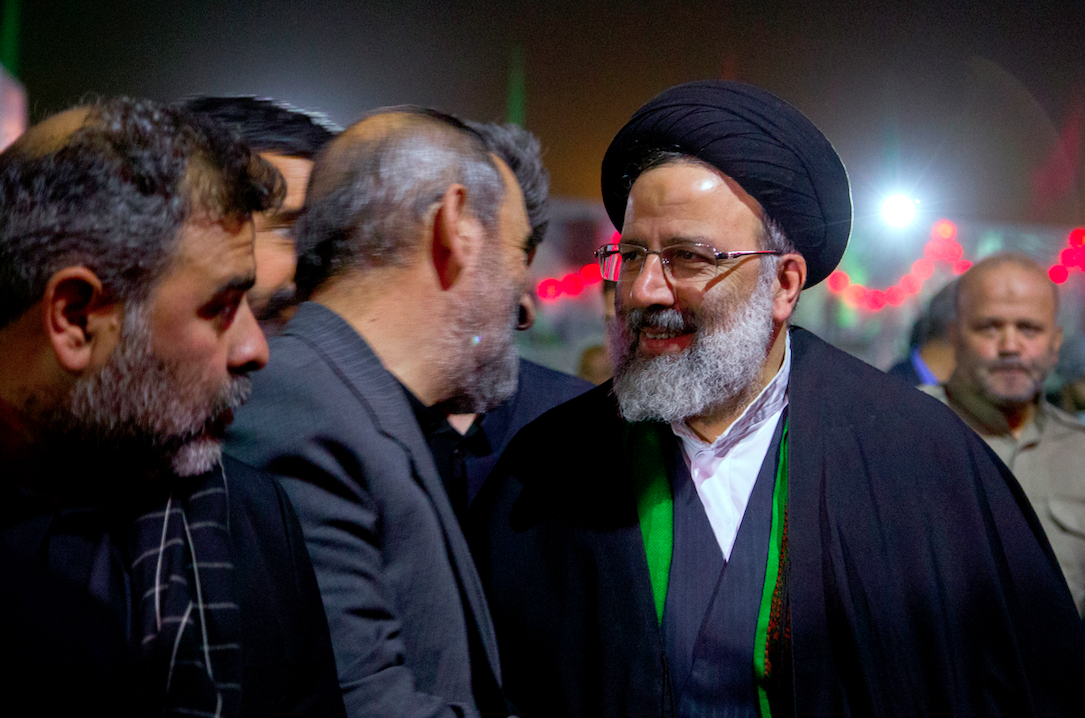
Iran’s President Ebrahim Raisi, shown here in 2016. (Mostafameraji, CC BY-SA 4.0, Wikimedia Commons)
By Ariel Gold and Medea Benjamin
Jacobin

 After a five-month hiatus, indirect negotiations between the U.S. and Iran resumed this month in Vienna in an attempt to revise the 2015 Iran nuclear deal (formally known as the Joint Comprehensive Plan of Action or JCPOA). The outlook isn’t good.
After a five-month hiatus, indirect negotiations between the U.S. and Iran resumed this month in Vienna in an attempt to revise the 2015 Iran nuclear deal (formally known as the Joint Comprehensive Plan of Action or JCPOA). The outlook isn’t good.
Less than a week into negotiations, Britain, France and Germany accused Iran of “walking back almost all of the difficult compromises” achieved during the first round of negotiations before Iran’s new president, Ebrahim Raisi, was sworn into office. While such actions by Iran certainly aren’t helping the negotiations succeed, there is another country — one that is not even a party to the agreement that was ripped up in 2018 by then President Donald Trump —whose hardline position is creating obstacles to successful negotiations: Israel.
On Dec. 5, amid reports that the talks might collapse, Israeli Prime Minister Naftali Bennett called on the countries in Vienna to “take a strong line” against Iran. According to Channel 12 news in Israel, Israeli officials are urging the U.S. to take military action against Iran, either by striking Iran directly or by hitting an Iranian base in Yemen. Regardless of the outcome of the negotiations, Israel says that it reserves the right to take military action against Iran.
Israeli threats aren’t just bluster. Between 2010 and 2012, four Iranian nuclear scientists were assassinated, presumably by Israel. In July 2020, a fire, attributed to an Israeli bomb, caused significant damage to Iran’s Natanz nuclear site. In November 2020, shortly after Joe Biden won the presidential election, Israeli operatives used remote control machine guns to assassinate Iran’s top nuclear scientist. Had Iran retaliated proportionately, the U.S. might have backed up Israel, with the conflict spiraling into a full-blown U.S.-Middle East war.
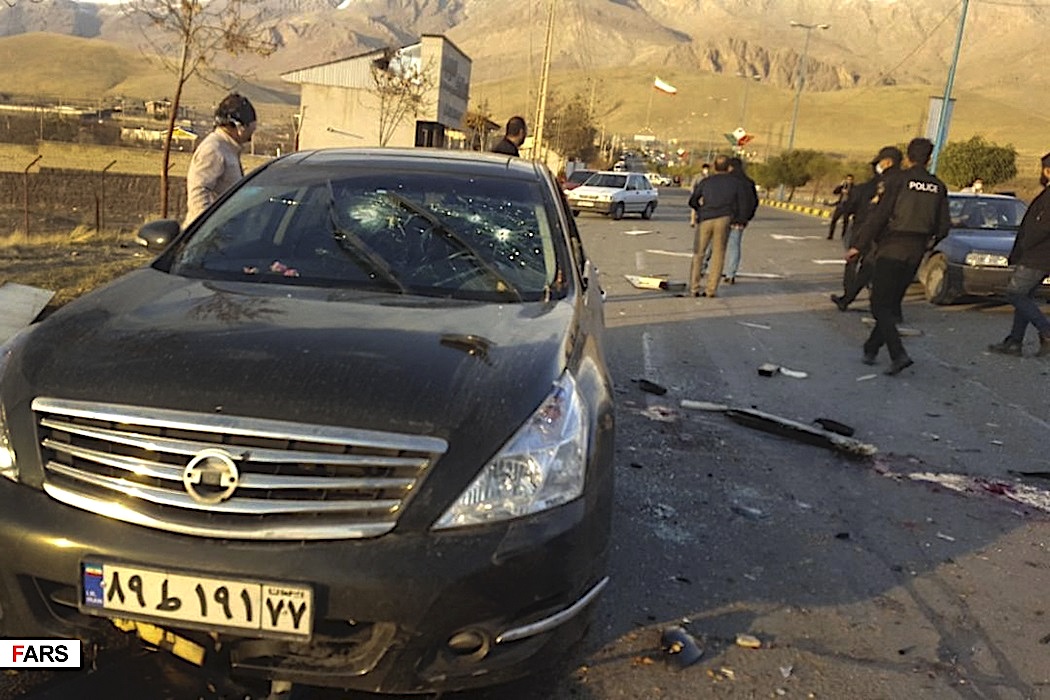
Iranian nuclear physicist and scientist Mohsen Fahhrizadeh was driving this car when he was assassinated in November 2020 outside Teheran. (Fars News Agency/Wikimedia Commons)
In April, as diplomatic efforts were underway between the Biden administration and Iran, sabotage attributed to Israel caused a blackout at the Natanz. Iran described the action as “nuclear terrorism.”
Ironically described as Iran’s Build Back Better plan, after each of Israel’s nuclear facility sabotage actions, Iranians have quickly gotten their facilities back online and even installed newer machines to more rapidly enrich uranium. As a result, American officials recently warned their Israeli counterparts that the attacks on Iranian nuclear facilities are counterproductive. But Israel replied that it has no intention of letting up.
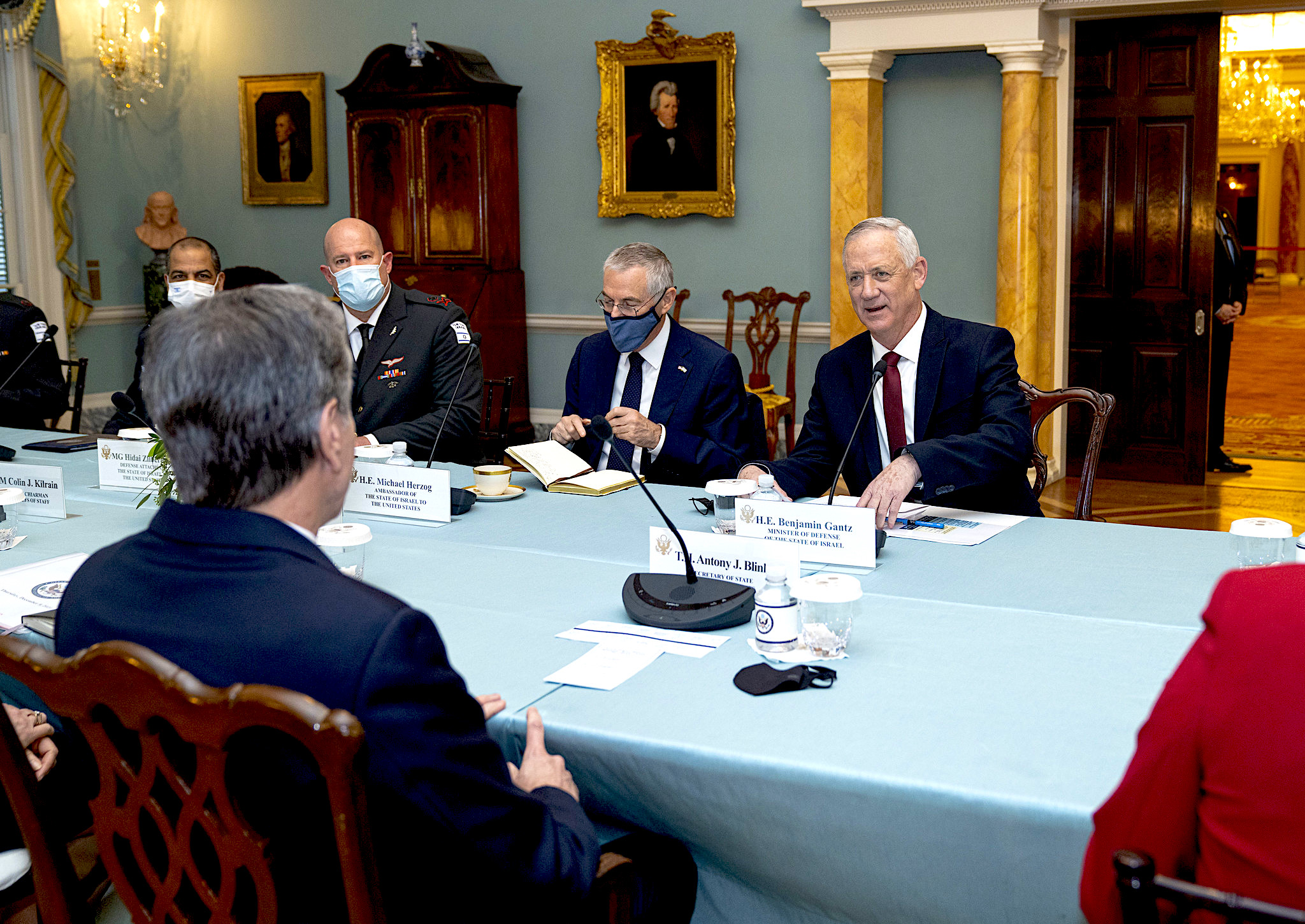
U.S. Secretary of State Antony Blinken, with back to camera, meets with Israeli Defense Minister Benny Gantz in Washington on Dec. 9. (State Department, Freddie Everett)
As the clock runs out to reseal the JCPOA, Israel is sending its top-level officials out to make its case. Israeli Foreign Minister Yair Lapid was in London and Paris recently asking them not to support U.S. intentions to return to the deal. Defense Minister Benny Gantz and Israeli Mossad chief David Barnea went to Washington for meetings with U.S. Defense Secretary Lloyd Austin, U.S. Secretary of State Antony Blinken, and C.I.A. officials. According to the Israeli Yedioth Ahronoth newspaper, Barnea brought “updated intelligence on Tehran’s efforts” to become a nuclear country.
Military Drills
Along with verbal appeals, Israel is preparing militarily. They have allocated $1.5 billion for a potential strike against Iran. Throughout October and November, they held large-scale military exercises in preparation for strikes against Iran and this spring they plan to hold one of their largest strike simulation drills ever, using dozens of aircraft, including Lockheed Martin’s F-35 fighter jet.
Support CN’s
Winter Fund Drive!
The U.S. is also readying for the possibility of violence. A week prior to the negotiations resuming in Vienna, the U.S.’s top commander in the Middle East, General Kenneth McKenzie, announced that his forces were on standby for potential military actions should the negotiations collapse. Yesterday, it was reported that Israeli Defense Minister Benny Gantz’s meeting with Lloyd Austin would include discussing possible joint U.S.-Israeli military drills simulating the destruction of Iran’s nuclear facilities.
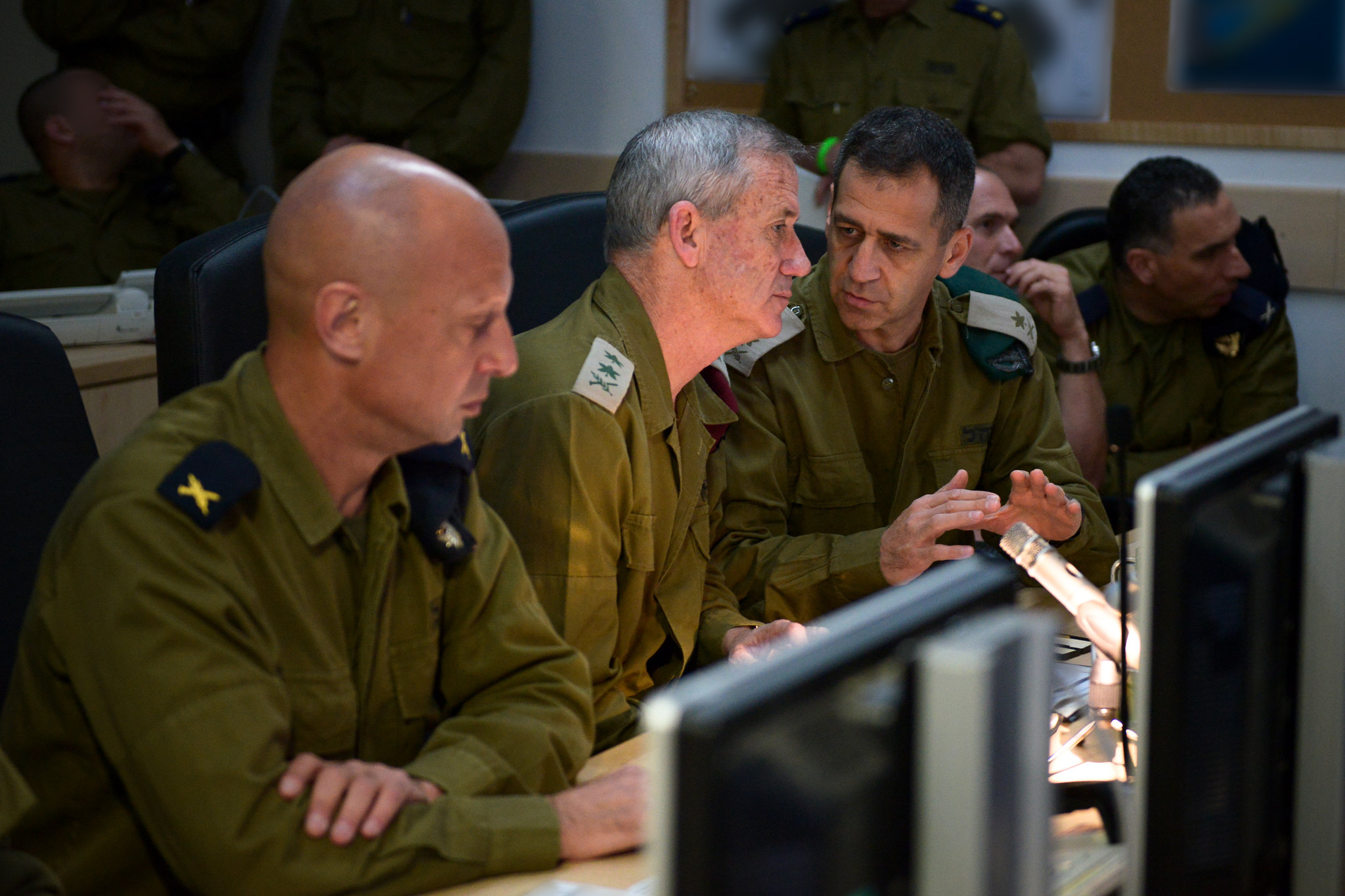
Benny Gantz, center, while serving as a military commander in 2014. (Israel Defense Forces, Flickr)
Stakes are high for the talks to succeed. The International Atomic Energy Agency (IAEA) confirmed this month that Iran is now enriching uranium up to 20 percent purity at its underground facility at Fordo, a site where the JCPOA forbids enrichment.
According to the IAEA, since Trump pulled the U.S. out of the JCPOA, Iran has furthered its uranium enrichment to 60 percent purity (compared with 3.67 percent under the deal), steadily moving closer to the 90 percent needed for a nuclear weapon. In September, the Institute for Science and International Security issued a report that, under the “worst-case breakout estimate,” within a month Iran could produce enough fissile material for a nuclear weapon.
The U.S. exit from the JCPOA has not only led to the nightmarish prospect of another Middle East country becoming a nuclear state (Israel reportedly has between 80 and 400 nuclear weapons), but it has already inflicted enormous damage on the Iranian people.
Iranian People Plagued by US Sanctions
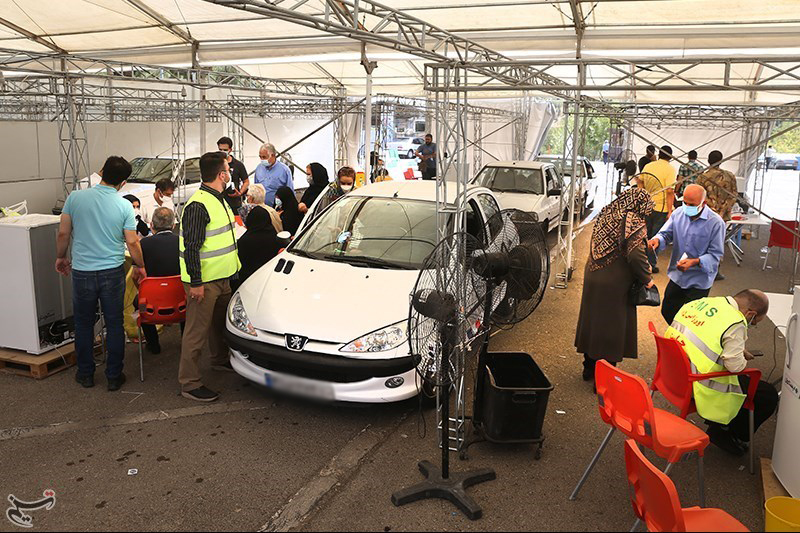
Drive-through Covid vaccination center in Iran this August. (Tasnim News Agency, CC BY 4.0, Wikimedia Commons)
The “maximum pressure” sanctions campaign — originally Trump’s but now under the ownership of Joe Biden — has plagued Iranians with runaway inflation, skyrocketing food, rent and medicine prices, and a crippled healthcare sector.
Even before the Covid-19 pandemic hit, U.S. sanctions were preventing Iran from importing necessary medicines to treat such illnesses as leukemia and epilepsy. In January 2021, the United Nations released a report stating that U.S. sanctions on Iran were contributing to an “inadequate and opaque” response to Covid-19. With more than 130,000 officially registered deaths so far, Iran has the highest number of recorded coronavirus deaths in the Middle East. And officials say that real numbers are likely even higher.
If the U.S. and Iran are not able to reach an agreement, the worst-case scenario will be a new U.S.-Middle East war. Reflecting on the abject failures and destruction wrecked by the Iraq and Afghanistan wars, a war with Iran would be catastrophic. One would think that Israel, which receives $3.8 billion annually from the U.S., would feel obligated not to drag the U.S. and their own people into such a disaster. But that doesn’t seem to be the case.
Though teetering on the brink of collapse, talks have resumed. Iran, now under a hard-line government that U.S. sanctions helped bring into power, has shown that it isn’t going to be an acquiescent negotiator and Israel is hell-bent on sabotaging the talks. This means it’s going to take bold diplomacy and a willingness to compromise from the Biden administration to get the deal resealed. Let’s hope Biden and his negotiators have the will and courage to do that.
Ariel Gold is the national co-director and senior Middle East policy analyst with CODEPINK for Peace.
Medea Benjamin is cofounder of CODEPINK for Peace, and author of several books, including Inside Iran: The Real History of the Islamic Republic of Iran.
This article is from Jacobin and republished with permission.
Help Us Cover the Assange Case!
Support CN’s
Winter Fund Drive!
Donate securely with PayPal
Or securely by credit card or check by clicking the red button:


While demanding that every nation with nuclear weapons begins immediate destruction of them all, we can also demand that until that day, Iran must be given full permission to develop as many of them as it feels necessary to counter the nuclear threats from apartheid Israel and the USA. It’s only fair, as any child could see.
Hey Tony …
I entirely agree with you – indeed it would be far better to establish a nuclear weapons free zone world wide than just in the ME. However, both ideas are pies-in-the-sky. Who could make this demand? Furthermore, who would listen to it never mind enforce it. It is common knowledge that Israel is a nuclear armed state. It is not a signatory to the non-proliferation treaty. They do not even admit that they possess the things.
How do you de-nuke a state as duplicitous as Israel? If and when we ever figure that out, then maybe we can work on how we de-nuke the rest of the planet.
The U.N. Security Council agreed to a nuclear free zone in the Middle East in 1991 and as foreseen at the time no progress has been made on it, blocked mostly by the only state in the region with nukes.
One very obvious way to resolve this problem would be to establish a nuclear weapons free zone in the Middle East.
However, it is not even being considered and will not be until we demand that it is.
Excellent suggestion, first proposed, actually demanded, by Egypt in 1990 and in the 1995 indefinite extension of the NPTand its following periodic reviews. This proposal / demand was endorsed by all other countries in the region (including Iran) except Israel, which is not a signatory of the NPT. Unfortunately the US and other Western powers supported Israel’s position and no real progress has been made to date. See armscontrol.org : WMD-Free Middle East Proposal at a Glance.